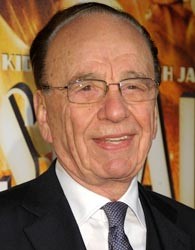Rupert Murdoch and his conglomerate News Corporation own divisions in virtually every form of today’s media: book publishing, newspapers and television. Whether fan or detractor, few can dispute the power that Murdoch holds in the industry.
Rupert Murdoch’s Early Days
Keith Rupert Murdoch was born on March 11, 1931, in Melbourne, Australia. His father, Sir Keith Murdoch, was a reporter who had gained renown for his coverage of World War I; he later became chief executive of Melbourne’s Herald & Weekly Times newspaper group.
Rupert Murdoch studied philosophy, economics and politics at Oxford University’s Worchester College, graduating with a Master’s degree in 1953. Murdoch then went to work as a journalist for two British papers, the Birmingham Gazette and the Daily Express, where he honed what would become two of his hallmarks: media business acumen and sensationalist reporting.
Murdoch’s Notable Accomplishments
Murdoch returned to Australia in 1954, after which he set to revamp the two Adelaide-based newspapers he had inherited from his father: the Daily Mail and The News. The latter was retooled into a paper whose content drew heavily from sex stories, with Murdoch himself penning many of its salacious headlines.
Sources in this Story
- Encyclopedia.com (Encyclopedia of World Biography): Rupert Murdoch Biography
- Biography.com: (Keith) Rupert Murdoch Biography (1931–)
- Museum of Broadcast Communications: Murdoch, Rupert K.
- The BBC: News Corp in $580m internet buy
- NBC News: How Influential Are James and Lachlan Murdoch, Heirs to Rupert’s Empire?
The circulation rates for The News went sky-high. In 1969, Murdoch took over London’s The News of the World and months later, took over flagging U.K. paper The Sun. Both papers’ take-up rates shot up, thanks to Murdoch’s by-now trademark blend of scandal and human interest stories, sports reporting and a generous dose of politically conservative spin. Another key change made to The Sun’s content early in Murdoch’s tenure as owner: the introduction of the topless “Page Three Girl,” now an iconic British tabloid offering.
Murdoch took his trade across the Atlantic and bought two San Antonio papers in 1973. One of those papers, The San Antonio News, later titled the Express News, was re-crafted into the Murdoch mold of fast-selling sex and scandal. He settled in the United States in 1974 and became a U.S. citizen in 1985.
Murdoch’s holding company News Corporation took over several other U.S. publications, including the New York Post and the Boston paper Herald America, which he renamed the Boston Herald. He also launched a brand-new tabloid, the Star, in 1974. He sold the Star and the New York Post in the late 1980s, both at a profit. (He bought the Post back in 1993.) During the 1980s, Murdoch also controlled The Times of London and the Australian, a paper that he had founded in 1964.
In 1985, Murdoch took over 20th Century Fox Film Corporation, in addition to various U.S. television stations. He united them into one company, Fox Inc., which became the first major American network since the mid-1950s to seriously compete with ABC, CBS and NBC. He also combined British book publisher William Collins & Sons and American publisher Harper & Row into one company, HarperCollins.
During the late 1980s, he took over Herald & Weekly Times Ltd., the Australian media group which his father once helmed, and launched what would eventually become Britain’s Sky Broadcasting.
The sluggish economic conditions of the late 1980s and early 1990s nearly led to the demise of Murdoch’s empire, pushing him to sell off most of his American magazine holdings to lessen his newly expanded debt load. He also had various tussles with the Federal Communications Commission during this period.
The Man and His Work
- “The Man Who Owns the News: Inside the Secret World of Rupert Murdoch” by Michael Wolff
- “The Murdoch Mission: The Digital Transformation of a Media Empire” by Wendy Goldman Rohm
- “Murdoch” by William Shawcross
The Rest of the Story
Murdoch’s major acquisitions over the past 10 years include the 2005 purchase of eUniverse, now Intermix Media, the parent company of social networking site MySpace.com for $580 million; and the $5 billion acquisition of Dow Jones and Company in 2007, which publishes The Wall Street Journal.
His personal and business lives collided in 2005 when his son Lachlan resigned as News Corp deputy chief operating officer, leaving his son James as the only one of his six children to work for the company. Lachlan returned to News Corp in 2014.
This article was originally written by Anne Szustek; it was updated January 19, 2017.











